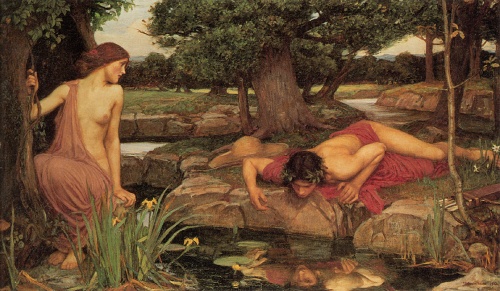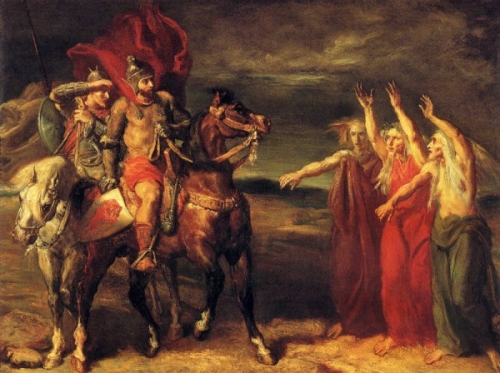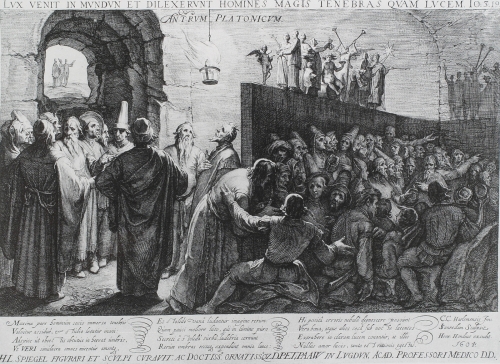
“Being” tends to be an extremely problematic term especially in twenty-first century philosophical and academic discourse. But in the artistic frame of the Narcissus myth, at least, the topic of ontology is chiefly explored through the characters of Echo and Narcissus. They are, in fact, presented at first sight as two distinct and antithetical beings, but they have foundationally similar, unconscious desires. Echo’s desire for union with Narcissus and Narcissus’ desire for union with his own reflection express their deeper, unconscious desires for a unified, complete Self; the failure to achieve such a union results in the dissolution of their beings. The psychoanalytic theories of Jacques Lacan will help us understand the complex relationship (or lack thereof) between the two characters and that which they have with their own Selves.
Lacan provides us with three major theories on the ego, the relationship between the Self and the Other, and desire. Lacan’s fundamental notion on the ego is the ego’s illusory nature. D’Alleva explains that “for Lacan, the ego – the sense of self as coherent, rational actor expressed in the word ‘I’ – is nothing but an illusion of the unconscious”[1]. Moreover, Lacan theorises that the unconscious is structured like language: it is composed of an arbitrary chain of signifiers and signifieds. For Lacan, then, “the process of becoming a ‘self’ is the process of trying to stabilize the chain of signifiers so that meaning – including the meaning of ‘I’ – becomes possible”[2]. With the arbitrary processes of the unconscious in motion, the individual is thus left with the illusion of the “I”, the ego.
The subject’s sense of the Other, according to Lacan, is created when the subject, as an infant, realises that it is separate primarily from its mother, then eventually from the rest of the people around it. The individual’s sense of Self, following the stage of sensing the Other, is brought about in the “Mirror Stage”, a stage wherein a baby sees itself in the mirror, and, seeing its own reflection, creates a concept of its own Self. Such a perceived concept is what Lacan calls a méconnaisance, a misrecognition; for the Self identified in the mirror is only an ontological illusion of the unconscious. The mirror image is what Lacan calls the “Ideal-I”, the ideal sense of Self with which the subject attempts to reconcile the reality of its own self-perception.
Lacan also theorises about the inherent sense of absence in the unconscious. Richter explains that “the sense of absence can take the form of mere lack (manque) or need (besoin), which force the psyche to make demands, or it can take the higher form of desire (désir)”[3]. The solution for the individual’s sense of absence is language: “Lacan says that language is always about loss or absence; you only need words when the object you want is gone”[4]. Language is an attempt to retrieve what is unconsciously absent – it is the bridge that connects the Desiring to the Desired. If language, then, is the noumenal link between the desiring subject to the desired object, the performative and phenomenal expression for desire is the Gaze[5]. D’Alleva says that “according to Lacan, we try to give structure and stability to our illusions, our fantasies of Self and Other, via the Gaze”[6]. The Gaze is, in other words, the medial point between the subject’s self-perception and its Ideal-I wherein the subject’s desire may be apprehended.
Lacan’s theories come into a strong interplay upon contact with the myth of Narcissus and Echo. Our route to unfold the discoveries from the interplay is to examine the stories individually but comparatively, with the overall context of the myth as a guide, and the direct and indirect implications of Lacan’s theories as instruments for insight.
In the myth of Echo and Narcissus, Echo is presented as a personification of her name. She is described in the myth as “a strange-voiced nymph…who must speak / Unless another speak”[7]. Her curse seals her fate as an echoing character: “All she can do is double each last word, / And echo back again the voice she’s heard”[8]. Echo is accordingly a “subject” in Žižek’s sense of the term. Žižek posits that “the subject’s elementary, founding, gesture is to subject itself. . . The subject’s activity is, at its most fundamental, the activity of submitting oneself to the inevitable”[9]. Echo’s curse, in line with a Žižekian perspective, is a curse of eternal verbal passivity. And cursed to be an echoing subject, she is subsequently deprived of a complete sense of Self. What she becomes is a mere signifier, devoid of the meaning and essence that the signified Other, whom she echoes, embodies.
With the absence of a complete sense of self, Echo consequently desires the Other. According to Richter, “it is in the true desire – for an object that is itself conscious and can desire us in return – that higher forms of self-consciousness arise”[10]. In Echo’s desire for the Other there is thus an underlying, ontological desire to complete her Being. If Echo is a Žižekian subject, then Narcissus, in Echo’s perspective, is her corresponding object: “that which moves, annoys, disturbs, traumatizes”[11]. His presence moves Echo into desire. Narcissus is a threefold object: he is Echo’s desired object inasmuch as he is the object with which Echo may achieve the completion of her sense of Being. He is, however – and more importantly – the Lacanian objet petit a, the unattainable object of desire, the object that thus “disturbs”, if not “traumatizes”, Echo.
Narcissus’ rejection and mockery of Echo leads to the literal dissolution of her Being. The myth recounts that “shamed and rejected. . .Her body shrivels. . .Only her voice and bones are left; at last / Only her voice”[12]. Echo’s relationship with Narcissus is a case of the Other responding to the subject with rejection. Echo fails in her to achieve a union the Other, a union which would otherwise have completed her Being, attaching a meaningful Signified to her empty identity as a Signifier. Echo’s body eventually disintegrates, and what is left is only her voice, a signifier of her identity. What is thus most tragic about Echo’s dissolution is that ultimately her story emphasises the ironic and profound emptiness of her character as a Signifier: not only is she deprived of a Signified to give her meaning, but what remains in the end is only a signifier of her Being-as-Signifier[13].
Narcissus, in turn, represents – to borrow a Lacanian term – a “fragmented body”[14] – or, in other words, a fragmented self. In the myth, he is introduced with a question from his mother to Tiresias: “Would he long years and ripe old age enjoy?” to which Tiresias replies, “If he shall himself know”[15]. The prophecy is eventually followed up with a curse granted by Nemesis: “So may he love – and never win his love!”[16] The curse marks Narcissus’ unconscious sense of absence; what he lacks is the perfect self, the Ideal-I. The existence of Narcissus as a character is fated with the curse of an elusive Self, the desire for the illusory Ideal-I. His desire is manifested through his Gaze, as indeed D’Alleva suggests about the action: “we reveal what we desire through the Gaze”[17]. Narcissus is doomed to spend his living moments gazing at his own reflection, desiring a theoretically impossible union with the Ideal-I. Thus, in a Lacanian point-of-view, the character of Narcissus is essentially fixated in the Mirror Stage.
Narcissus’ curse and eternal struggle in the Mirror Stage is brought about by an encounter with an Other, a “scorned youth”[18]. Squillace clarifies Narcissus’ situation for us: “The curse of self-love alights on Narcissus, in fact, from the mouth of a rejected male suitor, by the addition of whom to the traditional story Ovid suggests that what the youth spurns is not Echo per se . . .but any contact outside the circle of himself”[19]. In other words, Narcissus’ futile chase for the Ideal-I is brought about by his rejection of the Other. The concept of the Ideal-I is what Žižek calls the “transcendental I”, a “purely formal function which is neither noumenal nor phenomenal – it is empty, no phenomenal intuition corresponds to it”. Indeed, for Narcissus the Ideal-I is a transcendental illusion manifested in his own reflection. Narcissus, it is said in the myth, “could not clasp himself”[20]. He fails to realise the futility of his actions, and the narrator of the myth notes the dramatic irony: “You simple boy, why strive in vain to catch / A fleeting image? What you see is nowhere; / And what you love – but turn away – you lose! / You see a phantom of a mirrored shape; / Nothing itself”[21]. The curse upon Narcissus works psychologically and ontologically; a theoretically unified Self might have been achieved by him through a union with the Other, but in his rejection thereof he is left with a phantom image with whom union is impossible. What Narcissus consequently experiences is the dissolution of his Being. The myth marks that he is “by love wasted”, until eventually there is “but no body anywhere; / And in its stead they found a flower – behold, / White petals clustered round a cup of gold!”[22] As in the case of Echo, we see a dissolution of the body in Narcissus’ story. What remains is a flower, a signifier of Narcissus’ character. It is an ultimate dissolution of Being: the Signified ceases to exist, and even its signifier is transformed into a symbol, a thing so far removed from the Real in the mimetic order of things. The essence of Narcissus has been dissolved, and what remains of him no longer bears any semblance to his essence.
The two intricately related stories of Echo and Narcissus contain tragic accounts of the unbridgeable boundary between inherent absence and unreciprocated desire. Both characters seek a union that would give them a complete sense of Self and Being, but their failure to do so proves devastating. Echo and Narcissus seem at first to be antinomic characters, and such a perspective may justify the reason for their isolated deaths wherein they dissolve ununified with the other. But even in binary oppositions, theses and antitheses, a synthesis may be produced – unfortunately for the two characters no such synthesis is yielded.
[1] p. 96, Anne D’Alleva, Methods & Theories of Art History (Laurence King Publishing, 2012), 96-105.
[2] D’Alleva ,96.
[3] p.1112, Jacques Lacan, The Mirror Stage in The Critical Tradition: Classic Texts and Contemporary Trends, edited by David H. Richter (Bedford/ St. Martin’s, 2007), 1111-1128.
[4] D’Alleva, 97.
[5] The Gaze, capitalised, is “the process of looking” (D’Alleva, 104).
[6] 104.
[7] Lines 425-427, Ovid, Metamorphoses in The Oxford Anthology of Roman Literature, eds. Peter E. Knox and J.C. McKeown (Oxford University Press 2013), 274-188.
[8] Ovid, 441-442.
[9] p. 17, Slavoj Žižek, The Parallax View (Massachusetts Institute of Technology, 2006).
[10] Richter, 1112.
[11] Žižek, 17.
[12] Ovid, 467-473.
[13] I have capitalised the words Signifier and Signified when they directly refer to the characters in the myth; lower cases implicate everything else.
[14] Lacan, 1126.
[15] Ovid, 416-417.
[16] Ovid, 479.
[17] D’Alleva 104-105.
[18] Ovid, 478.
[19] xxiii in Ovid, The Metamorphoses edited by Robert Squillace (Barnes & Noble Classics, 2005).
[20] Ovid, 505.
[21] Ovid, 508-512.
[22] Ovid, 573, 595-597.



 In this essay I argue that the Old English elegies “The Wanderer” and “The Seafarer” demonstrate the instability and fragility of Anglo-Saxon society. The reason for such instability is that the members of the un-Christian Anglo-Saxon society have no knowledge of God nor subsequently could they have any relationship with him. My analogies are based primarily on Plato’s “Myth of the Cave” from Book 7 of The Republic, and shall be furthermore expounded upon with Plotinus’ writing “On the Intellectual Beauty”. After discussing the essential content of Plato’s myth and the relationship thereof with Plotinus’ work, I shall apply them both as filters for my interpretation first to “The Wanderer”, and then to “The Seafarer”.
In this essay I argue that the Old English elegies “The Wanderer” and “The Seafarer” demonstrate the instability and fragility of Anglo-Saxon society. The reason for such instability is that the members of the un-Christian Anglo-Saxon society have no knowledge of God nor subsequently could they have any relationship with him. My analogies are based primarily on Plato’s “Myth of the Cave” from Book 7 of The Republic, and shall be furthermore expounded upon with Plotinus’ writing “On the Intellectual Beauty”. After discussing the essential content of Plato’s myth and the relationship thereof with Plotinus’ work, I shall apply them both as filters for my interpretation first to “The Wanderer”, and then to “The Seafarer”.
DUSK AND THE UNCANNY IN CONRAD’S HEART OF DARKNESS
The dichotomy of Light and Darkness is noticeably prevalent and all-encompassing in Joseph Conrad’s Heart of Darkness, so much so that the symbolisms and meanings of this antithetical pair may seem at times to fall into ambiguity or to get muddled into complicated significations. Yet the novel remains comfortable with such a situation. Its themes thrive on ambivalence and a tone of seeming uncertainty. What at first glance appears to be a scene of incertitude for characters can turn out to be, after an uncovering of many complex layers, a moment of revelation, self-awareness, or existential understanding. In Conrad’s Heart of Darkness, the gulf between Light and Darkness – the gulf that harbours the uncanny, the gulf that represents Dusk – is depicted as a zone wherein Marlow experiences self-realisation and enlightenment.
There is in Heart of Darkness a gap in the dichotomy of Light and Darkness. This gap is magnified and made observable by the distinct contrast in the representative figures of Light and Darkness, and indeed they are portrayed to be almost archetypal. Kurtz is said to be “claimed” by “powers of darkness” (1989). The darkness embodied in Kurtz is universalised as Marlow describes the last moments of his life: “The brown current ran swiftly out of the heart of darkness, bearing us down towards the sea…and Kurtz’s life was running swiftly too, ebbing, ebbing out of his heart into the sea of inexorable time” (2003). The juxtaposition of these sentences parallels Kurtz’s heart with the “heart of darkness” that is found everywhere from the centre of the wilderness to which the phrase alludes, to the River Thames which it threatens to encompass. Kurtz’s position as a figure that embodies darkness is further solidified when he is described in his deathbed as not being able to see the “light…within a foot of his eyes” (2004). Indeed, his stare “could not see the flame of the candle, but was wide enough to embrace the whole universe, piercing enough to penetrate all the hearts that beat in the darkness” (2005). The irony of this description is in Kurtz’s inability to see light no matter how wide or universal his stare is. All he is able to see is darkness, and that darkness resides within him.
Inasmuch as Kurtz is unable to see the light, the Intended is ignorant of – if not unable to comprehend – the darkness in Kurtz. She is portrayed as an archetype of light and of what is beautiful, pure, and innocent. Marlow describes her thus: “She struck me as beautiful—I mean she had a beautiful expression. I know that the sunlight can be made to lie too, yet one felt that no manipulation of light and pose could have conveyed the delicate shade of truthfulness upon those features” (2007). She has “a pale head”, “fair hair”, a “pale visage”, and a “pure brow” (2007). All these fair and beautiful external features set her up in contrast with the darkness within Kurtz. However, her innocence, her “unextinguishable light of belief and love” (2008), is thought by Marlow to be incapable of understanding or bearing the reality of Kurtz’s darkness. He says that, for her, it would be “too dark altogether” (2010). He thus implies that there is a necessary separation between the dealings of Light and Darkness.
Following Marlow’s logic for separation, it would seem that the Darkness and Light that Kurtz and his Intended signify respectively have between them an unbridgeable gulf. And yet the novel complicates this distinction. Dusk, a time that rests between the bright and dark hours of the day, is depicted in the beginning of the novel with poignancy: “And at last, in its curved and imperceptible fall, the sun sank low, and from glowing white changed to a dull red without rays and without heat, as if about to go out suddenly, stricken to death by the touch of that gloom brooding over a crowd of men” (1955). It is in the light of this setting sun where the Nellie’s crew go through a contemplative and aesthetic experience: “We looked at the venerable stream not in the vivid flush of a short day that comes and departs for ever, but in the august light of abiding memories” (1955). It is also in the climate of this setting wherein Marlow’s narrative is unfolded: not in the brilliance of midday nor in the darkness of midnight, but in the dying light of dusk.
Dusk is the gulf between Light and Darkness, and this gulf may be equated to the realm of the uncanny, the realm of Freud’s Unheimlich. Indeed, insofar as Freud’s concept of the Unheimlich breaks down the binary boundaries between its own essence and that of the Heimlich, so does the concept and imagery of dusk break down the dichotomy of Light and Darkness. This area of the uncanny in the novel breaks down oppositions in such a way that there is certainty to be found in uncertainty and realisation in ambiguity. The gulf of the uncanny, the gap symbolised by dusk, is a dialectical realm wherein the ethos of Marlow’s character attains an understanding of its existence and that of the world and people around him. The culmination of Marlow’s experience, being a character situated symbolically in such a realm, is described by himself as such: “It seemed somehow to throw a kind of light on everything about me—and into my thoughts. It was sombre enough too—and pitiful—not extraordinary in any way—not very clear either. No, not very clear. And yet it seemed to throw a kind of light” (1958). In his experiences are fragments of self-realisation, revelations, and understandings, not least of which is his understanding of Kurtz’s darkness and his Intended’s sparkle of sublimity. Marlow also explains to his fellow seamen that “it seems to me I am trying to tell you a dream…No, it is impossible; it is impossible to convey the life-sensation of any given epoch of one’s existence” (1973). His contemplations and philosophies, unclear to himself at first, are constantly deconstructed and reconstructed in the course of his journey and his narrative.
Marlow is subsequently elevated into a state of enlightenment. He becomes representative of the individual who beholds the Truth and escapes the Platonic Cave, but who also consequently becomes alienated from his company. By the end of the novel he is said to have “ceased, and sat apart, indistinct and silent, in the pose of a meditating Buddha” (2010). And indeed he has already recognised his isolation in the artistic frame when he states, “We live, as we dream—alone” (1973). Yet this alienation, this dream-like uncanny state of retrospection, allows Marlow to observe and understand the universal darkness while remaining apart from it. He thereby becomes the didactic Individual, a signifier of the Particular marked especially by his contrast with the nameless Others, his fellow seafarers, to whom he shares his profound reflections on Truth and the human soul. In this perspective he is not alone. His life, as in his dream-like narration, is recounted with company. Together, they journey through the river of experience and past memories, with the threat of the looming darkness making their quiet solidarity all the more poignant.
Bibliography:
Conrad, Joseph. Heart of Darkness. The Longman Anthology of British Literature, ed.by K. J.H. Dettmar, Pearson Education, 2010. pp.1949-2010.
Leave a comment
Filed under Fantasy
Tagged as aesthetics, books, commentary, conrad, darkness, dreams, dusk, essay, freud, heart of darkness, human soul, humanity, imagery, light, literature, marlow, philosophy, reads, ships